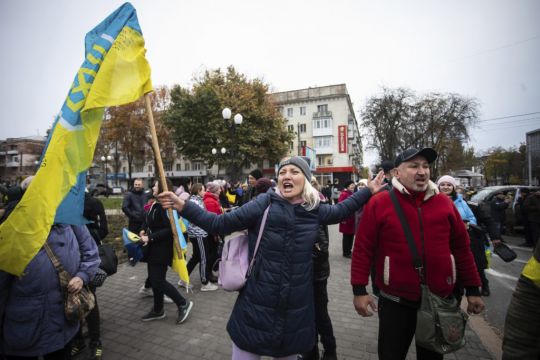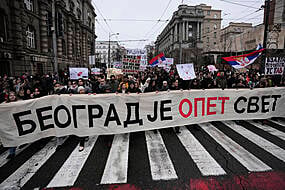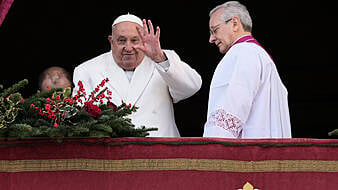Ukraine’s president has vowed to keep pushing Russian forces out of his country after they withdrew from Kherson, leaving behind devastation, hunger and booby traps.
The Russian retreat from the city marked a triumphant milestone in Ukraine’s pushback against Moscow’s invasion almost nine months ago. Kherson residents hugged and kissed the arriving Ukrainian troops in rapturous scenes.
In his nightly video address on Saturday, President Volodymyr Zelensky vowed there will be “many more such greetings” of Ukrainian soldiers liberating Russian-held territory.

He pledged to the people in Ukrainian cities and villages that are still under occupation: “We don’t forget anyone; we won’t leave anyone.”
Ukraine’s retaking of Kherson is a significant setback for the Kremlin and the latest in a series of battlefield embarrassments.
It came some six weeks after Russian President Vladimir Putin annexed the Kherson region and three other provinces in southern and eastern Ukraine in breach of international law and declared them Russian territory.
The US embassy in Kyiv tweeted comments by national security adviser Jake Sullivan, who described the turnaround in Kherson as “an extraordinary victory” for Ukraine and “quite a remarkable thing”.

The reversal came despite Mr Putin’s recent partial mobilisation of reservists, raising available troop numbers by some 300,000.
“Russian military leadership is trying and largely failing to integrate combat forces drawn from many different organisations and of many different types and levels of skill and equipment into a more cohesive fighting force in Ukraine,” the Washington-based Institute for the Study of War, a think tank that tracks the conflict, commented.
British Defence Secretary Ben Wallace said the Kremlin would be “worried” by the loss of Kherson but warned against underestimating Moscow.
“If they need more cannon fodder, that is what they’ll be doing,” he said.
As Ukrainian forces on Sunday consolidated their hold on Kherson, authorities contemplated the daunting task of clearing out explosive devices and restoring basic public services in the city.

One Ukrainian official described the situation in Kherson as “a humanitarian catastrophe”. The remaining residents in the city are said to lack water, medicine and food, and electricity supplies are poor.
Ukrainian police, who returned to the city on Saturday, called on residents to help identify collaborators with Russian forces during the eight-month occupation.
The national police chief of Ukraine, Ihor Klymenko, said on Facebook that about 200 officers are now working in the city, setting up checkpoints and documenting evidence of possible war crimes.
In what could perhaps be the next district to fall in Ukraine’s march on territory illegally annexed by Moscow, the Russian-appointed administration of the Kakhovka district, east of Kherson city, announced on Saturday it was evacuating its employees.

“Today, the administration is the number one target for Ukrainian attacks,” said the Moscow-installed leader of Kakhovka, Pavel Filipchuk.
“Therefore, by order of the government of the Kherson region, we, as an authority, are moving to a safer territory, from where we will lead the district.”
Kakhovka is located on the left bank of the River Dnieper, upstream of the Kakhovka hydroelectric power station.
Meanwhile, the city of Nikopol, further upstream, was heavily shelled overnight, Dnipropetrovsk Regional Council chair Mykola Lukashuk reported on Sunday.

Writing on Telegram, he said two women were wounded but are in a stable condition in hospital. One private house and two farm buildings were destroyed, while more than 40 residential buildings, 24 commercial buildings, a college, a register office and electricity networks were damaged.
According to Mr Lukashuk, the city of Marhanets also came under fire. Two private houses were damaged, but no injuries were reported.
Nikopol and Marhanets lie across the Dnieper River from the Zaporizhzhia nuclear power plant, Europe’s largest.
In Kherson, photos on social media on Saturday showed Ukrainian activists removing memorial plaques put up by the occupation authorities. A Telegram post by Yellow Ribbon, the Ukrainian resistance movement in the occupied territories, showed two people in a park taking down plaques picturing Soviet-era military figures.

Moscow’s announcement that Russian forces were withdrawing across the Dnieper River, which divides both the Kherson region and Ukraine as a whole, followed a stepped-up Ukrainian counter-offensive in the country’s south.
In the past two months, Ukraine’s military claimed to have retaken dozens of towns and villages north of the city of Kherson.
Ukrainian foreign minister Dmytro Kuleba, though, sought to temper the excitement over the Russian retreat from Kherson.
“We are winning battles on the ground, but the war continues,” he said.







